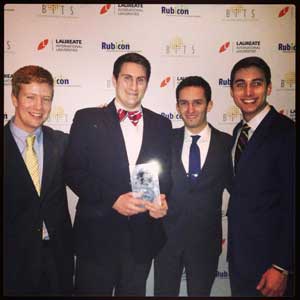 The winner—and still champion—is Purdue University.
The winner—and still champion—is Purdue University.
A team of four Krannert students won the 2013 Rubicon Contest, an international case contest for business students. The ImpactMakers—Andrew Walters, Pablo Puente, Marcus Glick and Brendan Bonner—took first prize in the seven-team competition in Iserlohn, Germany. In the previous event, held in 2011, a Purdue team called the ChangeMakers took the top spot.
The Rubicon Contest dates back to 2005. The back-to-back wins by Purdue represented the first victories in the competition by a non-German team. Team members are quick to attribute their success to what they've learned at Krannert, and they single out a case analysis course taught by Charles Haywood and an independent law class with Cliff Fisher as being particularly helpful. They also credit their previous experience in case competitions, as the students had more than 15 competitions under their belt heading to Rubicon.
"The case competitions round out our education," says Walters, who also doubles as Purdue Pete in his spare time. "You never fully understand what you learn in a lecture until you can apply it outside the classroom."
Bonner agrees, adding, "The competitions help us see how different pieces of business work together. We had to work as a team to solve the challenges we were given."
The team produced an eight-minute video to enter the competition. The Purdue squad was selected as one of eight finalists to travel to Germany, although the number dropped by one when a team from Nigeria lost its sponsorship.
When the team arrived in Germany, it had two cases to solve on day one. The first involved developing new green automotive technology, and the second dealt with crisis management. The time frames were short compared to most case contests—three hours for the first case and 90 minutes for the second.
"We had to research everything pretty quickly," Walters admits. "The key was to come up with our idea in the first 30 minutes, and then to spend the rest of the time working on the implementation. It helped that each of us had a specialty area."
Walters took the marketing lead, Bonner handled the finance side, Puente looked at the legal issues and Glick brought the presentation together as the team advanced to the finals. There, the members were given a three-hour case dealing with fracking, a somewhat controversial drilling technique used to reach natural gas reserves. The team endorsed a "closed-loop" method to make the process more ecological and economical.
In addition to the academic benefits of competing in a high-stress environment, the team members found a social component to the event. They spent time away from the contest speaking with participants, including those from India and Guatemala who were experiencing snow for the first time. The Krannert team also took in many of the local German sites.
"It was an unbelievable learning and leadership experience," Walters says.

